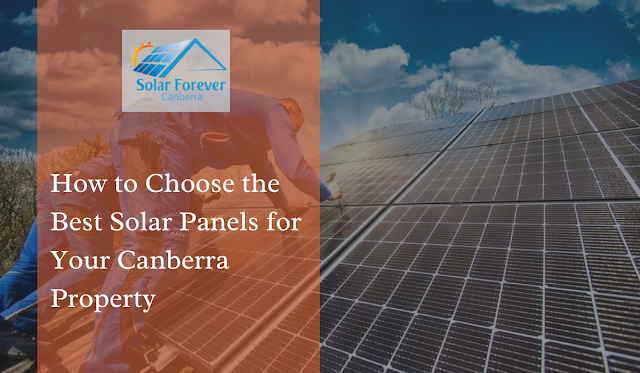How to Choose the Best Solar Panels for Your Canberra Property
If you’re considering solar panel installation Canberra, you’re taking a significant step toward reducing energy costs and embracing sustainability. Choosing the right system requires thoughtful planning to ensure maximum efficiency and long-term benefits. This guide will walk you through the key factors to consider when selecting a renewable energy solution for your property.
1. Understand Your Power Consumption
Before investing in a system, start by analyzing your household’s energy
needs. Check your utility bills to determine your average monthly electricity
usage in kilowatt-hours (kWh). This will help you estimate the size of the
system you’ll need to power your home effectively.
Don’t forget to factor in potential future changes. For instance, if you
plan to install an electric vehicle charging station or expand your living
space, you may need a system with a higher capacity.
2. Evaluate Your Roof’s Suitability
Your roof’s characteristics play a significant role in determining how
efficiently an energy system will operate. Consider aspects such as orientation,
tilt, and shading. Many solar companies in Canberra will
assess these factors to design a solution tailored to your property.
·
Orientation and Tilt: In the
southern hemisphere, north-facing rooftops tend to receive the most sunlight.
East- and west-facing roofs are also viable, though slightly less efficient. A
tilt angle of around 30° is often ideal for maximizing energy generation.
·
Shading: Assess the roof for
obstructions like trees, chimneys, or nearby structures that may cast shadows.
Even minor shading can reduce efficiency. If shading is unavoidable,
technologies like microinverters or optimizers can help mitigate energy losses.
3. Learn About Different System Types
Energy systems generally come in three main types: monocrystalline,
polycrystalline, and thin-film technologies. Each option has unique benefits
and drawbacks.
·
Monocrystalline: These are known
for their high efficiency and sleek design. They perform well even in low-light
conditions and require less roof space but come at a higher cost.
·
Polycrystalline: These are
slightly less efficient than monocrystalline options but more affordable. They
work well in sunny environments, making them a practical choice for
budget-conscious buyers.
·
Thin-Film: These are
lightweight and flexible but less efficient and durable compared to crystalline
systems. They’re better suited for unconventional installations or specific use
cases.
For most homes, monocrystalline or polycrystalline options offer the best
combination of performance and value.
4. Check Efficiency Ratings
Efficiency measures the percentage of sunlight converted into electricity.
Higher efficiency options produce more power per square meter, which is
especially beneficial for homes with limited roof space.
Many trusted solar installers Canberra recommend choosing
systems with an efficiency rating of 18% or higher. These systems ensure
consistent performance and can help you get the most out of your investment in
renewable energy.
5. Look for Strong Warranties
Renewable energy systems are a significant investment, so it’s important to
choose products with robust warranties. There are generally two types of
warranties to consider:
- Performance Warranty:
Guarantees that the system will maintain a specific output level over
time, typically spanning 25–30 years.
- Product Warranty: Covers
defects in materials or workmanship and usually lasts between 10–25 years.
Opt for systems with longer, more comprehensive warranties to ensure
reliability and long-term peace of mind.
6. Choose the Right Converter
The converter is a critical component that transforms the electricity
generated into a usable form for your home. There are two main types of
converters:
- String Converters: These
are cost-effective and suitable for properties with minimal shading.
- Micro Converters:
Installed on each unit, these are better for properties with complex
layouts or shading issues but are more expensive.
Discuss your property’s layout with a professional to determine which type
of converter will work best for your system.
7. Explore Costs and Incentives
The price of renewable energy systems can vary widely based on factors like
brand, size, and efficiency. While it’s tempting to choose the most affordable
option, higher-quality systems often provide better long-term value.
Take advantage of government rebates and financial incentives to offset the
initial cost. Programs like the Small-scale Renewable Energy Scheme (SRES) can
significantly reduce expenses. Check with local authorities to ensure you’re
accessing all available benefits.
8. Work with Experienced Professionals
The quality of workmanship is just as important as the quality of the system
itself. Select an experienced and accredited professional to ensure your system
is installed and configured correctly.
Research potential service providers, read customer reviews, and request
multiple quotes to find a reliable partner. Reputable companies will offer
expert guidance, manage necessary approvals, and provide ongoing support after
the setup is complete.
9. Consider Energy Storage Options
Adding storage to your system allows you to store excess energy for use
during the night or on cloudy days. While energy storage increases the upfront
cost, it provides greater independence from the grid and protection against
rising electricity prices.
Popular storage solutions include options from brands like Tesla, LG Chem,
and Sonnen. Explore different products to find one that suits your budget and
energy needs.
Final Thoughts
Transitioning to renewable energy offers a powerful way to achieve
sustainable living while saving money on electricity. If you’re planning a solar panel installation Canberra, consider factors
like roof suitability, system efficiency, and professional expertise to make
the best choice. With the right solution in place, you’ll enjoy clean,
renewable energy for years to come.

.png)

Comments